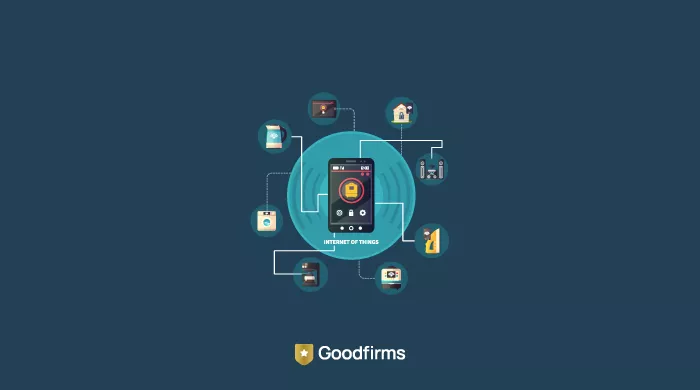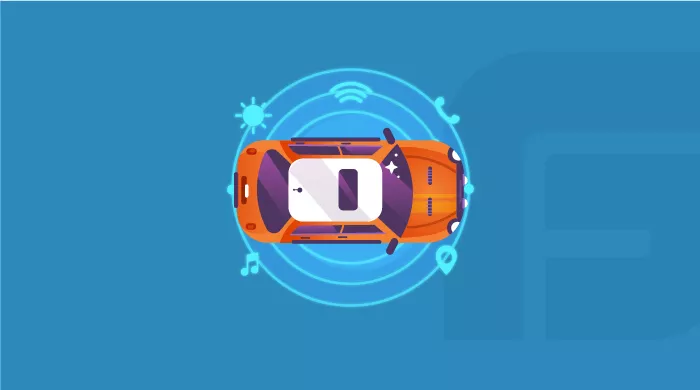“Tracking supply chains like raw materials, finished goods, or containers for optimizing logistics and maintaining stocks.”
“Keeping track of parking space and garages for tenants so that they don’t experience any problems while parking their car.”
“Getting real-time information about transportation fleets like their location or important parts like tire pressure and coolant level.”
The examples I shared above show the meteoric rise of IoT use cases in different industries. In the coming years, the IoT industry is poised to cross $2 trillion annually.
Also, Statista has predicted that IoT connections are poised to cross 38.13 billion connections by 2028.
.png)
But despite all of this, companies are finding it difficult to get seasoned developers for their IoT projects.
Canonical Reported 68% of Businesses are Struggling to Hire an IoT Developer
Why is it so?
This is mainly due to the nature of such projects where one needs to have diverse skill sets in areas that they previously were unaware of in the first place.
What if one wants to deploy robots in their warehouses, they would need a developer skilled in the ways of robotics and artificial development.
Or, if someone wants to establish a network of beacons, they would need a developer proficient in wireless connectivity and can analyze its data.
IoT is like a convergence between operational technology and information technology. This makes the required skill ceiling so high that companies struggle to find experts for their projects.
If like them, you too are trying to find a reliable IoT development partner, then this blog is for you.
What core skills to look for in an IoT developer?
What questions to ask an IoT development company before signing a contract with them, and where to find them?
Lastly, which geographical location should you outsource your IoT project to? And what are the region wide costs of it?
This blog will address all of these questions.
First, let's start with the topmost skills that you should look for in an IoT developer.
Crucial Skills to Look For in a IoT Developer
Statista has predicted that the total number of connected devices will reach 75 billion by 2025.
Whereas the revenue in the IoT market is projected to reach USD $1,177.00bn in 2023.
.png)
So, the IoT professionals are in great demand nowadays. But like we said previously, the skill ceiling for building an IoT application is high and requires diverse skill sets.
Below, we describe in detail the skills to look for when you hire an IoT developer for your project, including the role they play in building IoT devices. This is important, so pay close attention as the success of your project depends on the developers that are working on it. Without further delay, let’s start:
Knowledge of Artificial Intelligence and Machine Learning
IoT generates endless amounts of data. So, you will need a developer skilled in the ways of AI & ML to analyze this information and share the feedback with you.
This can help you in many ways, but here is one specific use-case scenario.
Let’s say you have installed IoT sensors and devices in a building that measures energy consumption.
A developer with AI & ML skills can analyze the data generated by these sensors and devices and highlight when the building experiences peak demands in the energy.
This will aid you in optimizing energy distribution.
Also, with this data, you will be able to identify when energy is getting wasted, like when lights or appliances are left on when no one is present in the room.
You can then send recommendations to occupants on adjusting their energy usage to save money.
IoT developers with skills in AI & ML can develop anomaly detection models that can help you identify when your sensors and devices need maintenance and detect equipment failures.
They can also build predictive models to calculate the future energy consumption of the building to help you plan maintenance schedules of your IoT devices and sensors.
Knowledge of Node.JS Development
By nature, IoT devices are asynchronous, as events do not occur at fixed levels and don’t depend on each other’s existence to function correctly.
Node.JS has event-driven architecture, in which the execution of code is based on events rather than a traditional linear flow. It doesn’t wait for a task to get completed before moving to the next one. It utilizes an event loop to handle multiple events at the same time.
Thus, Node.JS is an excellent choice for managing connections and data flow from various IoT devices.
With its ready-to-use modules and libraries that are open source, IoT developers with Node.JS skills can use it to integrate various IoT protocols like MQTT and CoAP and to enable interaction with different components of your IoT device.
They will also be able to build highly scalable IoT applications with the help of this runtime environment, as it uses JavaScript language, which is widely used for web development. These applications can handle many connections simultaneously and even run on low-powered devices.
Also, IoT developers can create RESTful APIs with Node.JS that lets you collect data, manage communications between different IoT devices, and access them remotely.
Knowledge of Mobile App Development
IoT devices are connected machines that require software to function seamlessly. That's why you will need an IoT developer with skills in mobile app development.
For example:
Suppose you are building an IoT solution to deliver a better shopping experience. In that case, an IoT developer with mobile app development skills can build an application that lets you reduce checkout lines, get customer data in real time, and track items on the shelves.
In another scenario:
Let’s say that you are building an IoT solution for transportation and logistics:
Mobile app development will allow IoT developers to create an IoT application that helps companies track the delivery of goods, services and manage their fleet. The application can even monitor temperature, humidity, and other parameters to ensure the safe delivery of products.
For security purposes, mobile app development can be used for implementing features like authentication and encryption to protect sensitive information in the IoT application.
Knowledge of UI/UX
Whenever users get a hand on a new application, they would often feel overwhelmed due to their ignorance of its functioning.
That’s where UI/UX comes into play, As a good user interface will help users navigate through the different functionalities and features of your IoT device.
Because the less the learning curve, the better.
With the help of different UI/UX elements, an IoT device can show data in a readable format. For example, a fitness tracker will show essential information like your weight, blood pressure, what distances you run or walk, and your heart or lung function.
For the sake of maintaining good health, such insights can be immensely valuable, isn’t it?
Also, first impressions matter! Users care about how the application is presented in front of them. You have approx 8.25 seconds to capture their attention; otherwise, they will bail out.
So, an IoT developer with requisite UI/UX skills can build an interface that ensures a careful balance of simplicity, accessibility, seamless user flow, effective use of visuals and animations, personalization, and, lastly, providing exceptional value to users.
Rest assured, all of this will skyrocket your user engagement.
Knowledge of QA Testing
IoT devices share data with each other through APIs. So, it is essential to have a developer with Q/A skills that can thoroughly test the API; otherwise, it can expose the data that can leak confidential information, resulting in the theft of intellectual property.
It can even harm users by sending them wrong data.
Let me share an example to explain the point:
Imagine you have built a smart band that collects users' health information through sensors and then sends this data to their dietician, who helps in customizing the meal plans.
But what if your device sends the wrong data? The dietician will prepare the wrong meal, which will negatively impact your user's health.
To prevent this from happening:
QA testers will perform a thorough API testing and prevent the above scenario from turning into reality.
Companies often don't pay much attention to QA because they want to be cost-effective, which could harm users.
Take, for example, the Verkada hack.
Verkada, a cloud-based surveillance, was hacked in March 2021. The attackers gained personal information belonging to people using this software. They even got access to live feeds of over 150,000 cameras installed in factories, schools, hospitals, and prisons.
It was later found that approx 100 employees have super admin privileges, giving them access to thousands of customer cameras.
So, learn from their mistakes!
A thorough QA testing of IoT applications is a must.
You don't want to be in the news for the wrong reasons now, do you?
A QA tester can perform thorough security testing of APIs and ensure that it is foolproof.
It is one of the best decisions you can make for your business.
Now you know what skills to look for when you hire an IoT developer, the next step is to find an IoT development partner that will work on your project.
But, how to find the right one?
Don’t worry, below I have highlighted essential questions that will help you gauge the right one.
Fundamental Questions for Finding a Reliable IoT Outsourcing Company
It’s essential to ask relevant questions before outsourcing the IoT project. This will ensure the outsourcing company is able to meet the project requirements and completes it without hassles and within the required timeline. Below are some important questions that you can ask before finalizing their contract with an outsourcing partner. These questions are divided into different sections.
-
For Assessing the Experience When Hiring the IoT Company
- What is the track record of the company in the IoT Industry?
- What does their portfolio look like in terms of successful projects?
- Who are the previous clients that the company has worked with in the past?
- What IoT technologies and platforms does the company specializes in?
- What Hardware or Software is the company using for building IoT applications?
- Has the company worked on similar IoT projects before?
-
To Get General Information About the Team and Resources of the IoT Company
- What kind of qualifications do the IoT developers working for the outsourcing company possess?
- What’s the testing process the company plans to adopt?
- Where will the IoT development team be located?
-
To Get an Idea Regarding How the IoT Company Handle Projects and Their Clients
- What methodology will the company use for developing an IoT application?
- Who will be the company’s main point of contact?
- How often will the company provide progress updates for its project, and what level of transparency will it provide?
- If the project gets delayed or there are some changes down the line? How will the company resolve it?
- How will the company integrate the existing business systems with IoT?
-
To Assess the IoT Company’s Support Post Project Completion
- Will the company provide 24/7 support for the IoT project once it gets completed?
- What security measures will the company undertake to protect the privacy and data security of the IoT application?
-
For Pricing and Contract
- How much will the company charge for developing an IoT project?
- Will the company sign a legal contract before partnering on this project?
- Will the company sign a non-disclosure agreement to keep everything confidential?
These questions will help assess whether the IoT outsourcing company is the right fit for you or not.
But then, where to look for such companies?
Don’t worry; Goodfirms will help you with that.
How to Find an Iot Development Company With Goodfirms
Goodfirms is a B2B review and rating platform that will provide you with a list of 100,000+ outsourcing companies from 100+ countries for your outsourcing projects.
These companies haven’t been chosen randomly; Goodfirms recognizes how the marketplace is saturated with outsourcing companies, making it difficult for people like you to find a genuine outsourcing partner that is credible, safe, and trustworthy.
To help you in this endeavor, we at Goodfirms have compiled 60,000+ verified reviews and ratings and regularly highlights top-performing firms through its company performance algorithm.
To get started:
Visit the Goodfirms Website
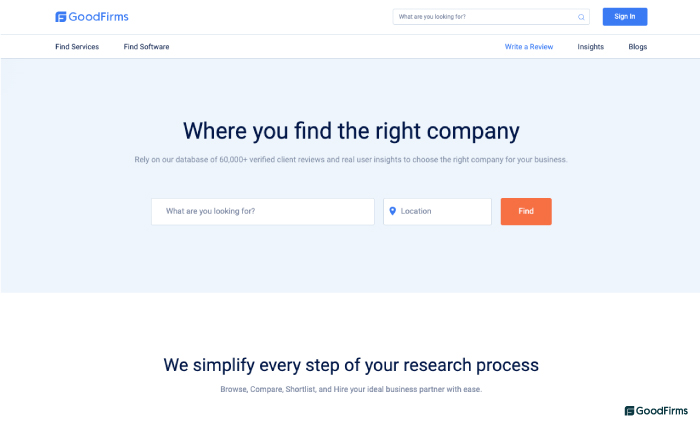
Head over to the Goodfirms, type in IoT development, select preferred locations, and click ‘find’.
Apply the Filter Option
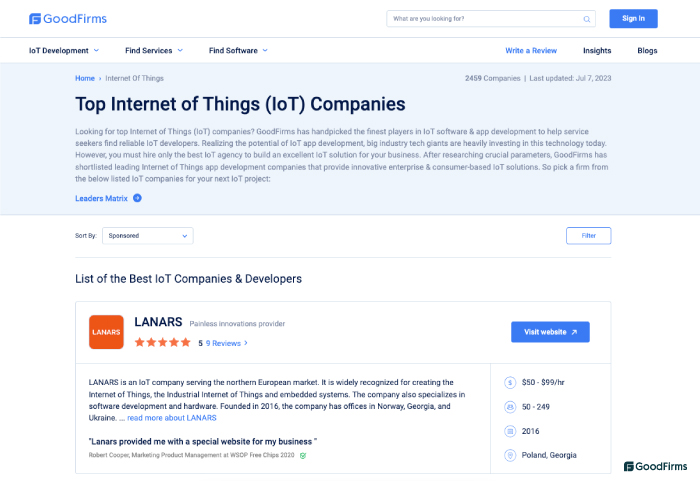
The filter option will let you customize the search request further. For example, you can personalize your search based on hourly rates, services, no of employees, industry type, and no of reviews. Click on Apply once you have set the parameters.
Browse the Directory Page
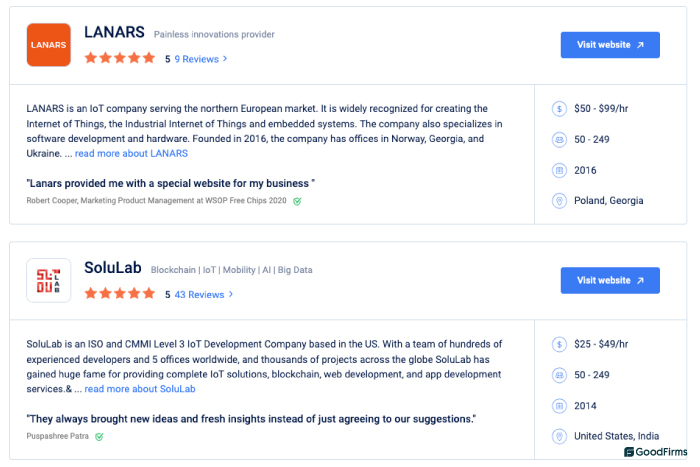
The directory page will list all the IoT companies that provide outsourcing services.
Click on read more to learn in detail about the individual companies. It highlights what industries, clients, and services they focus on. By scrolling down, you can also check their reviews and portfolios.
Get a Curated Shortlist
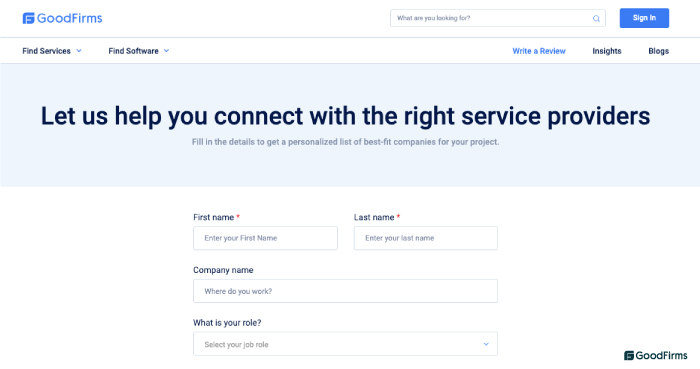
If you want a handpicked list of companies, then click on Get a Personalized Shortlist and fill in the details. Goodfirms will then present a list of IoT development companies that match your requirements.
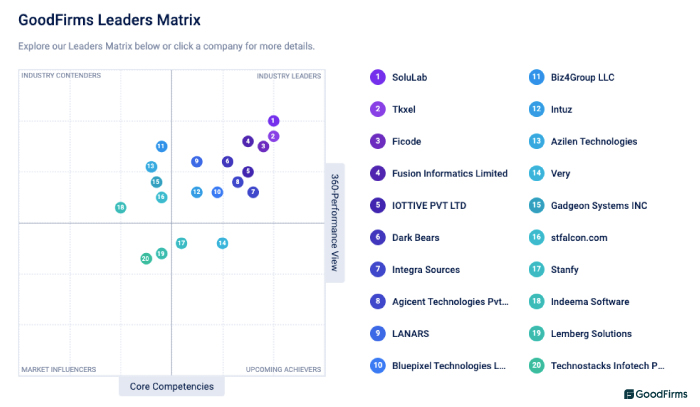
In addition to all of this, you can also check Goodfirms’ leaders matrix, which is a comprehensive analysis of all the IoT outsourcing firms listed in the directory. With the help of its proprietary algorithm, Goodfirms has categorized IoT firms into different categories such as:
- Industry Leaders
- Industry Contenders
- Market Influencers
- Upcoming Achievers
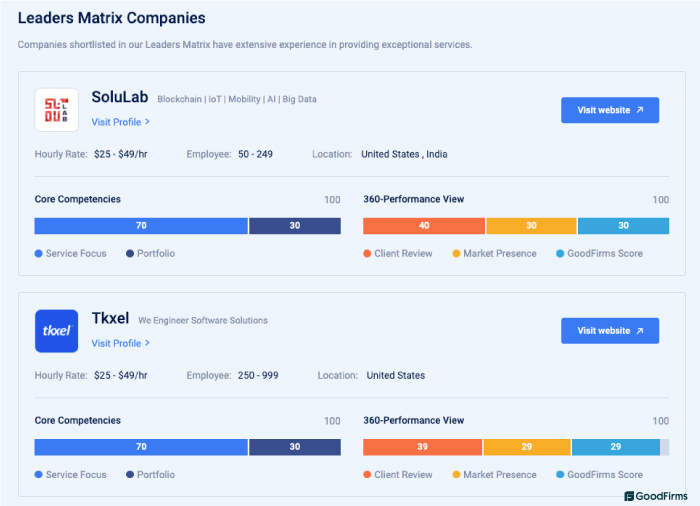
IoT companies listed in the leaders matrix have extensive experience in the field of Internet of Things and have generated a record of providing exceptional services.
Parting Thoughts
The information shared in this blog will help you identify, evaluate, and choose the right IoT development partner that aligns with your goals and objectives.
It is crucial to find the right outsourcing company as the success and failure of your project depends on them.
For sake of credibility, check their portfolio and success stories. Ensure that they have the right skills, expertise, and experience with IoT projects. The outsourcing partner you choose to work with should be flexible and demonstrate full stack capabilities.
Choose the geographical location of your outsourcing partner carefully.
The IoT technology will continuously evolve, so see to it that your outsourcing partner is aware of the latest trends in this technology field.
Work with them on a short term contract and see their quality of work. If you are satisfied with their performance, go for long term projects.
FAQs
-
Are IoT Developers in Demand?
Yes! Statista predicted that the total number of connected devices will reach 75 billion by 2025. So, IoT professionals are increasingly in demand. IoT is increasingly getting adopted in all industries to become more efficient, reduce costs, and for providing a better customer experience.
-
What do IoT Programmers do?
They make predictions based on the data collected by the IoT devices. IoT developers are also responsible for developing, managing, and monitoring IoT systems.
-
What are IoT Development Services?
IoT development services involve creating, designing, deploying, and supporting IoT solutions.





